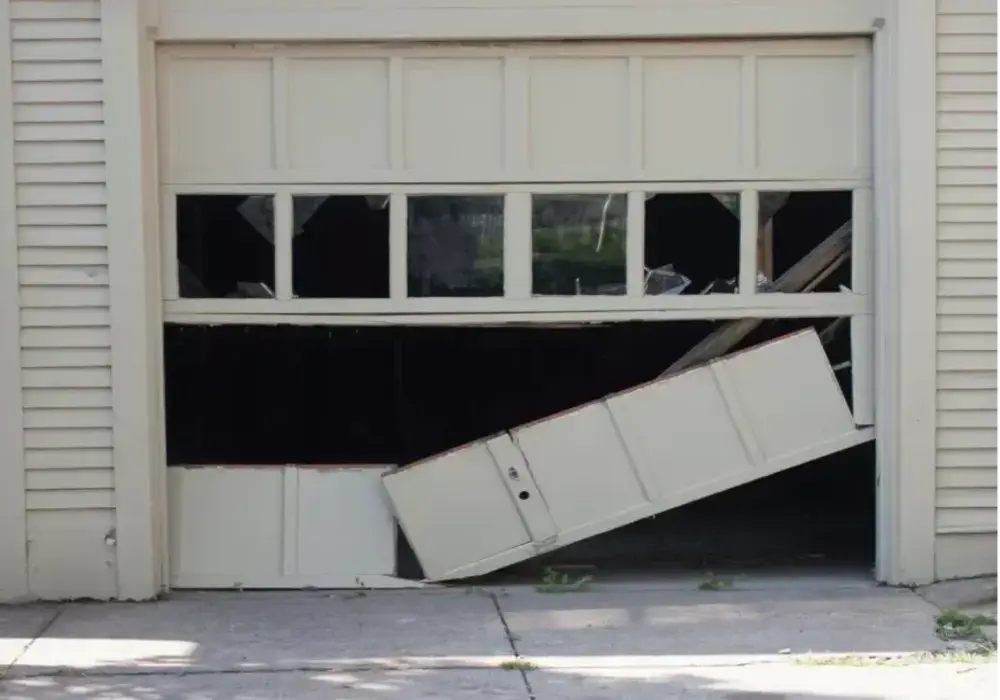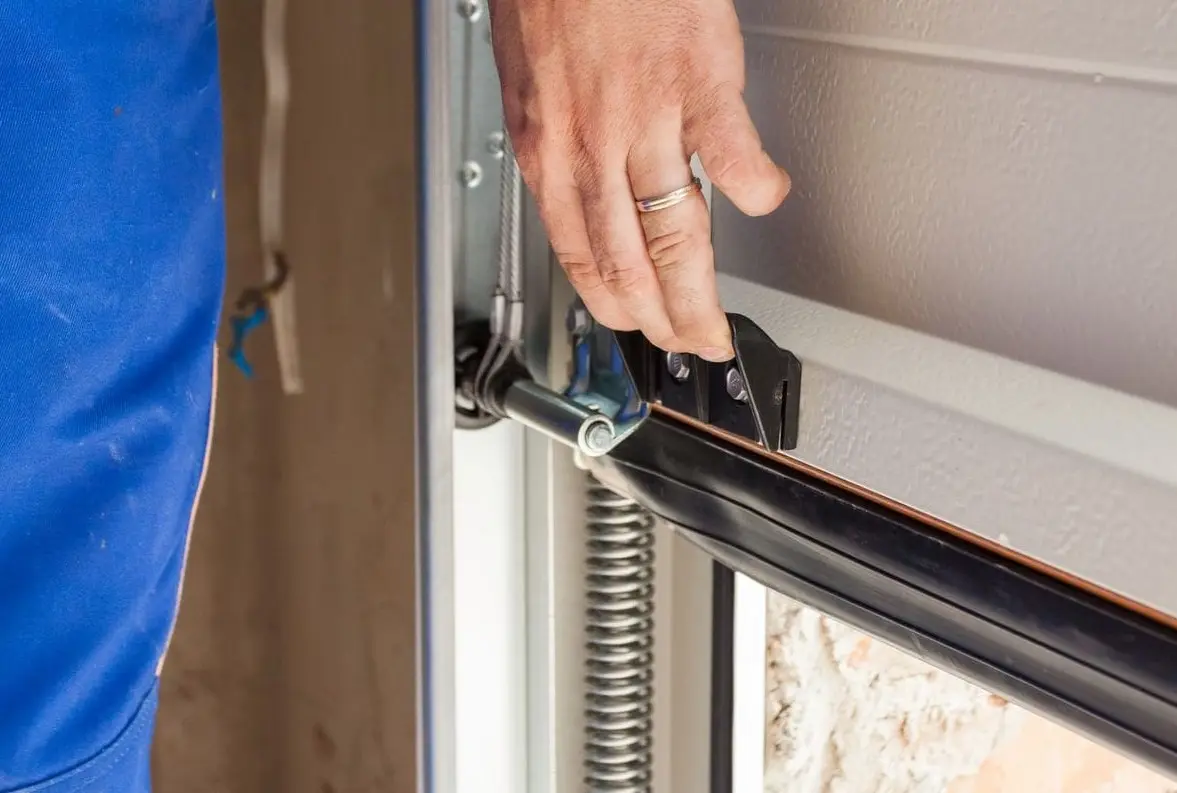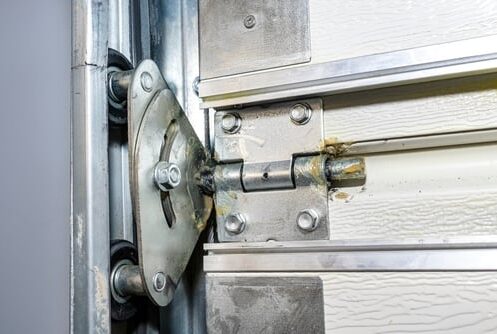Is your garage door squeaking every time it opens? That annoying noise could be a sign of something more serious.
Don’t let it disrupt your day or cause further issues.
In this guide, we’ll explore the common causes of a squeaky garage door and show you how to fix it, keeping things quiet and running smoothly.
How to Fix a Squeaky Garage Door Homeowner?
To fix a squeaky garage door, lubricate the hinges, tracks, and rollers with a silicone-based or garage door lubricant to reduce friction and eliminate the squeak.
Key Takeaways:
- Squeaky garage doors are often caused by friction from lack of lubrication, worn-out parts, or misalignment.
- Regular lubrication, tightening loose parts, and replacing worn rollers can fix most squeaky door issues.
- For complex problems, such as broken springs, it’s best to call a professional.
Why Does My Garage Door Noise?
Before diving into the solutions, it’s important to understand what’s causing the noise. If you have a garage door in Hampshire, IL, squeaks often result from friction between moving parts, such as the door’s hinges, rollers, or tracks.
Here are the most common culprits behind a squeaky garage door:
1. Lack of Lubrication
Just like any other mechanical system, garage doors need regular lubrication to keep everything running smoothly.
Over time, the lubricants that keep the rollers, hinges, and other moving parts moving freely can dry up or wear away, leading to friction—and in turn, squeaks.
If you haven’t lubricated your door in a while, this could very well be the cause of the noise.
2. Worn-Out Rollers
The rollers on your garage door play a crucial role in its movement. If the rollers are worn out, bent, or damaged, they may create friction and noise as they move along the tracks.
The materials that rollers are made from (steel, plastic, or nylon) can also affect how much noise they generate. Older, worn-out steel rollers are particularly prone to squeaking.
3. Loose or Broken Hinges

Hinges are used to connect the various sections of your garage door, allowing it to bend and fold as it opens and closes.
If any of the hinges are loose or broken, they may cause friction between the door sections as they move, resulting in a squeak.
Over time, hinges can also become rusty, which may amplify the noise.
4. Misaligned Tracks
If your garage door tracks are misaligned or bent, the rollers will not run smoothly along the tracks, creating friction and squeaks.
Misalignment can also cause your garage door to become stuck or not open properly, making the squeaking a sign of a more serious problem.
5. Weathered or Damaged Springs
Garage door springs are responsible for helping lift and lower the door. If they become damaged or rusted, they might make an unpleasant squeaking noise as they stretch and contract — one of the common signs your garage door spring is broken.
Springs are essential for the proper functioning of the door, and their condition can directly affect both the noise level and the door’s performance.
How to Fix a Noisy Garage Doors
Now that we’ve covered some of the main reasons for a noisy garage door, let’s look at some easy, effective solutions to silence that irritating noise.
1. Lubricate Moving Parts
The simplest and most common solution to a squeaky garage door is lubrication or grease. Regularly lubricating the moving parts will ensure smooth operation and reduce friction.
Here’s how to do it:
Lubricating your garage door every 6 to 12 months can prevent squeaking and extend the lifespan of the components.
2. Tighten Loose Hinges and Bolts
Check all the hinges and bolts on your garage door. Tighten any loose screws and bolts, especially the ones holding the door sections together.
If a hinge is broken, replace it as soon as possible. This will not only stop the squeaking but also ensure the door operates properly without any risk of the hinges failing.
3. Replace Worn-Out Rollers

If your garage door rollers are old or damaged, it may be time to replace them.
Steel rollers are known to wear out quickly, so consider upgrading to nylon rollers, which are quieter and require less maintenance. For professional assistance with this upgrade or any other garage door issues, you can rely on Sheridan IL garage door repair services to ensure the job is done efficiently and correctly. To replace the rollers, follow these steps:
4. Align the Tracks
Misaligned tracks are another common cause of squeaky garage doors. If the tracks are slightly off, you can align them with a few simple tools. Here’s how:
If the misalignment is severe or the track is damaged, it’s best to call a professional to avoid further complications.
5. Replace or Repair Springs
Garage door springs are vital for smooth door operation. If they are rusted, cracked, or stretched, they may make a squeaking noise.
Replacing or repairing springs requires professional expertise, as they are under high tension and can be dangerous if mishandled. For safe and reliable service, it’s best to contact a professional who specializes in garage door repair in Newark IL to ensure the job is done correctly and safely.
If you suspect your springs are the problem, it’s best to call a professional garage door technician to inspect and replace them safely.
Frequently Asked Questions
1. How do I stop my garage door from squeaking?
Lubricate the moving parts, tighten loose hinges and bolts, and replace any worn-out rollers. Regular maintenance will help keep the door quiet.
2. What causes a garage door to squeak?
Friction from lack of lubrication, worn-out rollers, broken hinges, or misaligned tracks are common causes of squeaking garage doors.
3. Can I fix a squeaky garage door myself?
Yes, you can fix a squeaky garage door by lubricating the moving parts, tightening loose screws, and replacing damaged rollers. For complex issues, consider calling a professional.
Conclusion
A squeaky garage door can be an annoying problem, but with the right tools and knowledge, it’s a fixable one.
Whether it’s caused by lack of lubrication, worn-out rollers, loose hinges, or misaligned tracks, most issues can be resolved with a little time and effort.
Regular maintenance, including lubricating the moving parts and tightening screws, will help keep your garage door functioning smoothly and quietly. If issues persist or become more complex, it’s best to seek garage door repair in Ottawa, IL to ensure safe and efficient operation.
If you’re not comfortable performing repairs yourself, or if the problem is more complex (such as broken springs or severe mechanical failure), don’t hesitate to call a professional to ensure the issue is fixed properly.
A quiet, well-functioning garage door not only improves the overall comfort of your home but also extends the life of the system.

